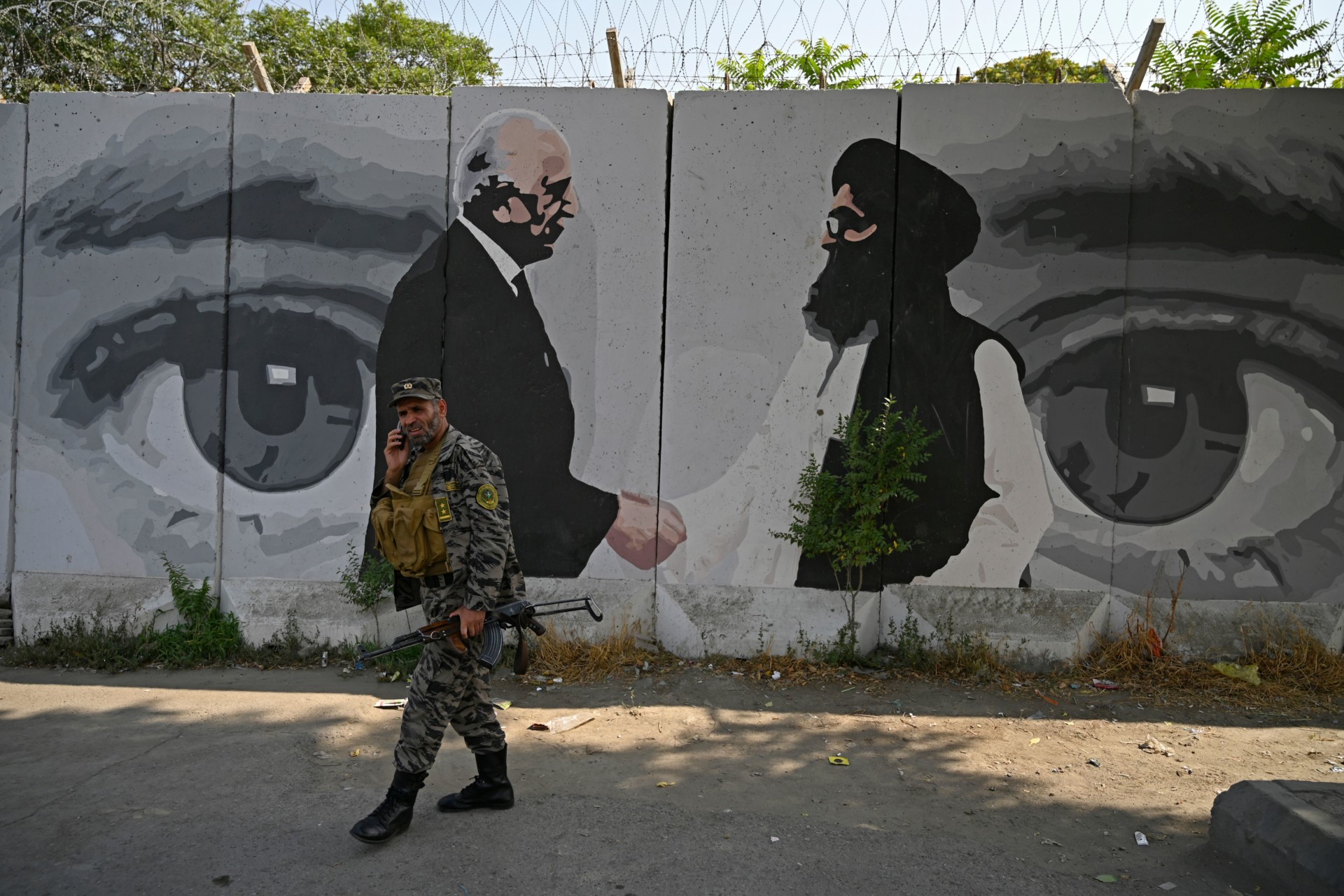Names are not always just names. They can signify very different things to different people. I was reminded of this during a recent visit to Crete, where I encountered an Egyptian from Alexandria.
Ayman moved to Crete 30 years ago after falling in love with the Mediterranean island, which reminded him of his coastal hometown but was quieter and more orderly. Nevertheless, he retained a very Egyptian outlook when it came to names.
“But isn’t Iskander a Christian name?” Ayman asked in confusion, after I introduced our son. His confusion was compounded by the fact that my name is Khaled, which people in Egypt and some other Arab countries associate with Islam. However, neither of these assumptions are correct — nor is the assumption that a Muslim father must necessarily pass on his religion.
Although the vast majority of people named Khaled are Muslim, I have encountered non-Muslims with that name, which is not uncommon among Christians in Lebanon, for example. This is particularly the case among pan-Arabists because Gamal Abdel Nasser’s eldest son was called Khaled.
Just as there is nothing especially Islamic about the name Khaled, which predates Islam, there is nothing terribly Christian about the name Iskander (Arabic for Alexander), which predates Christianity. In fact, Iskander is a fairly common boys’ name in Tunisia, where my son once had two other boys with the same name in his class when we lived there. Before that, the only other Iskander he had met in person was an aging Assyrian Christian in Jerusalem.
Iskander is also a common name in Turkic countries, Iran and some other Muslim-majority countries. In Turkey, it is even the name of a popular kebab dish. When we took our son at age 5 to taste “Iskender kebap” in Istanbul, he refused to touch it until we reassured him that it was not made of young boys named Iskander.
Derived from Aléxandros, which means “defender of the people,” the Greek version of my son’s name was popular in Ancient Greece. In addition to the ease with which Iskander can be pronounced by most people, its lack of association with any (living) religion was a major factor behind its appeal to us.
Before Iskander was born, it was important to my wife (who is Belgian) and me to find a neutral name that did not presuppose a particular faith, because we are both of the firm conviction that our son should be entirely free to choose the belief system that appeals most to him.
And with a few exceptions, like in Egypt and Palestine, it has worked. In Europe, only people with knowledge of Arabic know where the name comes from, with many Belgians assuming, for some bizarre reason, that it is a Scandinavian name.
“We want our son to learn about his dual heritage, but we also want him to decide for himself what his beliefs are,” I explained to Ayman, who is raising his children in the Christian faith and sends them to a small Coptic church in Crete.
This is important not only because of our abstract belief in freedom of religion and of conscience but also because, on a personal level, I did not really enjoy that liberty growing up, and I don’t wish my son to have to struggle with labels he did not choose.
Long before I could even grasp what faith meant, I was branded a Muslim from the moment I entered this world. My Egyptian birth certificate marks my religion as “Muslim,” which is also true of my adult identification papers.
Luckily, despite her own profound faith, my late mother raised us as Muslims but never pushed any of us to practice Islam against our will. She also raised us to question even established religion, out of the belief that the only true path to faith was one of self-discovery and knowledge.
Though this worked for some of her offspring, unfortunately for her, my doubts only grew and multiplied with time, until eventually I abandoned not just Islam but religion in its entirety. While my absence of religious faith broke her heart, and probably made her fear what awaited me after death, she knew I was an atheist before I came out of the closet about it and accepted the reality without recrimination or anger.
My family’s and friends’ acceptance of who I am has made my journey in life much easier than for many others who leave Islam and are disowned, rejected or ostracized by their families and communities.
Out of dread of this social excommunication, some decide to keep their lack of faith to themselves. Becoming what you might call crypto-atheists, they must suffer the agony of deception and dissimulation, living their lives pretending to be what they are not.
In countries where atheism is outlawed — it’s punishable by death in countries like Iran and Saudi Arabia — many must keep their skepticism secret not just from family but also from society.
In Saudi Arabia, one of the most repressive theocracies in the world, those found guilty of atheism or “apostasy” can be flogged pitilessly or receive capital punishment. For example, in 2017, one man, named in the media as Ahmad Al-Shamri, who allegedly renounced Islam and Muhammad on social media, was reportedly sentenced to death.
A thriving community of skeptics and atheists exists out of sight
Despite the enormous risks involved, a thriving community of skeptics and atheists exists out of sight and beneath the radar of the Saudi authorities, connecting mostly online but sometimes also in the real world. Even though Saudi Arabia is where Islam was born and sees itself as the leader of the Muslim world, a full fifth of the population say they are not religious and 5% are “convinced atheists,” according to a Gallup Poll conducted in 2012.
Some of these atheists are drawn to break cover and seek out like-minded individuals because of the profound sense of loneliness evoked by leading a double life. “I’m as closeted as ever. It makes me feel anxious and I struggle with myself. I sometimes ask myself: What if I’m wrong and everyone who is on the opposite side is right?” Maya (not her real name), an Egyptian who abandoned her faith while living in Saudi Arabia, told me. “That self-confidence I have when I’m surrounded by other nonbelievers or slightly open-minded people, like in Egypt, for example, makes me want to leave here asap.”
Though Egypt is more open-minded and tolerant than Saudi Arabia, it, too, is no paradise for atheists. The contemporary Egyptian state and society possess something of a Dr. Jekyll and Mr. Hyde attitude toward unbelief.
On the one hand, the constitution, rhetorically at least, guarantees absolute freedom of belief and there are no laws explicitly outlawing atheism or apostasy. This enables some atheists to openly express their rejection of religion without any harm inflicted on their person or their freedom.
On the other hand, Egypt has draconian blasphemy laws that are exploited by some elements of the state and crusading vigilante Islamist lawyers to selectively and randomly crack down on and persecute some skeptics and atheists.
One person who has fallen afoul of these laws is Sherif Gaber. The young freethinker first entered the public eye when he was a student at Suez Canal University following a smear campaign in 2013 by faculty members.
In 2015, Gaber was released on bail pending a retrial. He went underground but courageously refused to be silenced by the state or vigilantes. Gaber runs a popular anti-religion YouTube channel where the videos he produced have been viewed millions of times.
When attempting to flee Egypt in 2018, Gaber was arrested at the airport. After his release, he went into hiding again until he could work out an escape plan. Despite repeated attempts to leave Egypt and solidarity from abroad, Gaber appears to still be in Egypt and in hiding.
Compared with people like Gaber, I have had it easy. I have spent over a dozen years openly writing and speaking about atheism, as well as criticizing Islam and religion, not just in the Western media but also in some Arab publications. The worst I have experienced to date is occasional online abuse and threats but nothing serious enough for me to fear for my safety. In the real world, I have angered and riled up some religious conservatives enough for them to lose their tempers and call me unpleasant things. However, no incident has yet come to blows, though there have been some close calls.
Atheists and atheism are also widely misunderstood by many Arabs and Muslims. At one extreme, there are those who believe us to be Satanists, partly out of the conviction that those who do not worship God must, by implication, bow down to the devil.
There are others who believe that we have no moral compass and that we are debauched degenerates and disillusioned depressives. “An Arab atheist is usually a parasite — someone who claims to be knowledgeable but is not and will probably eventually commit suicide,” wrote a columnist in a Saudi newspaper. “An Arab atheist is usually a drunk, certainly a degenerate and has definitely nothing to offer.”
This insulting and ignorant attitude springs partly from the fact that many have not knowingly met an atheist. It is also influenced by the conviction that morality springs from religion, despite the findings of modern anthropological studies that show it is religion that springs from our innate sense of morality.
Although I disagree on many moral and ethical issues with religious conservatives, such as when it comes to sexual freedom and gender rights, I do not feel I am immoral or amoral in comparison. Moreover, I do not feel that the absence of God has made my life poorer or more depressing — quite the contrary.
Some Muslims, including some who claim to be enlightened and progressive, accept my right to believe what I want but do not believe I should talk about it publicly because it offends believers and supposedly challenges and threatens the social fabric.
This view not only does not stand up to intellectual scrutiny, but also is highly bigoted and offensive. There are people in Europe who find Islam to be offensive and a threat to the social fabric. Should European Muslims then be forced to conceal their faith?
Of course not. And I am a vociferous opponent of any forces that try to limit the freedom of belief or expression of Muslims in Europe, so why do some Muslims feel they are entitled to limit my freedom of conscience?
Moreover, do such people really prefer that I and other skeptics live a lie as hypocritical Muslims, rather than be honest and open atheists and unbelievers? If they can live with that, I cannot. My convictions are an integral part of my identity and so hiding or distorting them would involve a personal denial of who I am.
Although I possess no missionary designs and have zero desire to “convert” people to my beliefs, I also find it important to be open about who I am because there are many out there who share similar doubts but are in no position to express them, with the sense of abject isolation and loneliness that engenders. I want people like that to realize that they are not alone and that they are most certainly not freaks.
This kind of concealment also plays into the hands of conservatives and radicals who wrongly claim that atheism and skepticism are foreign imports that have no place in Muslim societies because Islam is so self-evidently true (and probably better than its rivals) and belief is the natural state for Muslims. However, the more I have delved into the three Abrahamic faiths, the more I have become convinced that the differences among them is like the differences in branded sportswear: indistinguishable to the agnostic and heathen but a source of great pride and identity to the wearer.
Skepticism and unbelief have always been and will always be integral to Islamic societies, at some times and places tolerated and celebrated, at others suppressed and persecuted.
In medieval times, for example, Middle Eastern societies were far more accepting and accommodating of irreligiosity, irreverence and unbelief than their European counterparts.
Take Abu al-Alaa al-Maarri (973-1057), the blind Syrian poet, philosopher, rationalist and hermit who was not only skeptical of religion but was also an early advocate of extreme birth control, convinced, as he was, that humans should not reproduce at all.
Despite his irreverent views, al-Maarri was a highly respected scholar of his day who turned his small hometown of Maarra, near Aleppo, into a magnet for poets, philosophers, students, princes and other admirers who were drawn by his philosophy, humility, hospitality, generosity and asceticism.
In one verse, al-Maarri intuited a view confirmed a millennium later by modern anthropological research: that humans are generally, despite the irrationality and contradictions of religion, predisposed to believe in a god and the afterlife and possess a religious “instinct.”
Now this religion happens to prevail
Until by that religion overthrown,
Because men dare not live with men alone,
But always with another fairy tale.
As a sign of how far matters have apparently regressed more than a thousand years after al-Maarri’s death, jihadists from the Nusra Front decapitated in 2013 all the statues of the blind poet it could find. They would have probably beheaded the revered poet and philosopher himself, or at least flogged him and tortured him until he “recanted,” if he were alive today.
But it would be a mistake to think that skepticism died after the so-called golden age of Islam. It continued to survive, and sometimes thrive, at different intensities depending on time and place.
For instance, al-Maarri’s “The Epistle of Forgiveness,” which depicts a fictional journey to the afterlife in which pagans and irreverent poets live in a highly bureaucratic heaven, inspired the Iraqi poet Jamil Sidqi al-Zahawi to write “Revolution in Hell” (1931). In this epic poem, humanity’s most daring and original thinkers have been condemned to eternal damnation as punishment for their courage, while the obedient and pro-establishment are rewarded with everlasting paradise, in a remarkable parallel to how Arab patriarchal dictatorships operate. The subversive inhabitants of hell, led appropriately enough by al-Maarri, storm heaven and claim it as their rightful abode, perhaps mocking the widely held belief that atheists are Satanists.
Despite the apparent rise of radical Islamism, I feel recent years have marked a major turning point
Despite the apparent rise of radical Islamism, I feel recent years have marked a major turning point toward the acceptance of and demand for freedom of belief and expression. The violence of conservative Islamic regimes and nonstate groups is, in my view, a sign of weakness, vulnerability and retreat, not strength, confidence and advance.
Not only do surveys and anecdotal evidence point to a rise in irreligiosity and religious skepticism across the Middle East, millions of people of faith are losing or have lost faith in political Islam and want religion removed from politics — the very definition of secularism.
I have witnessed this on a personal level, too. Since I came out of the closet about the abandonment of my faith, I have encountered not only a healthy number of skeptics but also a surprising level of tolerance and acceptance of unbelief by many ordinary Arabs and Muslims.
I am regularly and pleasantly surprised that my writings on religion and Islam, including my book “Islam for the Politically Incorrect,” have generally been well received, including by some conservative Muslims who, even if they don’t agree with many of my conclusions, appreciate both my honesty and the nuanced reality I depict.
It is my hope that, in these tumultuous times of rapid social change and upheaval, it is this tolerant, pluralistic, open and honest streak that ultimately gains the upper hand.
SEE
LA REVUE GAUCHE - Left Comment: Search results for ARAB ANARCHISM
http://plawiuk.blogspot.com/2006/02/my-favorite-muslim.htm




